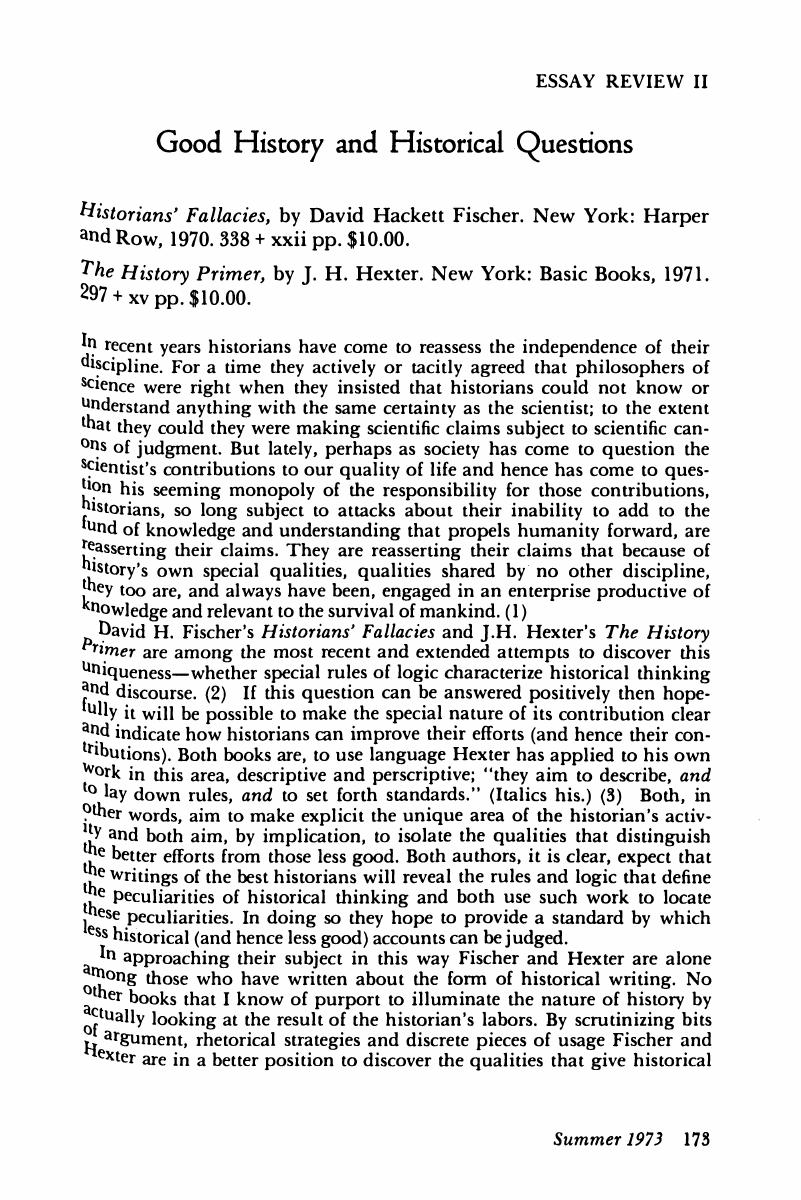No CrossRef data available.
Article contents
Good History and Historical Questions
Published online by Cambridge University Press: 02 June 2017
Abstract

- Type
- Essay Review II
- Information
- Copyright
- Copyright © 1973 by New York University
References
Notes
1 See the concluding remarks of Fischer and Hexter.Google Scholar
2 Fischer, p. xv and Hexter, p. 6.Google Scholar
3 Hexter, p. 13.Google Scholar
4 See the volume Gardiner, Patrick, ed., Theories of History (Glencoe, 1959) for an example.Google Scholar
5 Fischer, p. xvii.Google Scholar
6 Ibid., pp. xvii–xviii.Google Scholar
7 Those who are troubled by this should consult the devastating essay review of Fischer's book by Louis Mink in History and Theory 10 (1971): 107–12.Google Scholar
8 Sociologists, cultural anthropologists and novelists for example often concern themselves with the past also.Google Scholar
9 Fischer, p. 306.Google Scholar
10 Ibid., p. 316.Google Scholar
11 Ibid., pp. 317–18.Google Scholar
12 This seems further demonstrated by his reliance on the recent work of analytic philosophers like Morton White and Arthur Danto who are still essentially trying to assimilate history's truth to that of science.Google Scholar
13 Fischer, p. 155.Google Scholar
14 They are simply requests for an explanation or a signal that an author intends to offer one without disclosing how he plans to do it. The latter depends on what he decides, in a specific context, will best satisfy his audience and enable it to continue following his account. See Hexter, pp. 24 and 32.Google Scholar
15 Fischer, p. 15.Google Scholar
16 Ibid., p. 94. For other examples of a similar kind see his discussions of “why” questions, of “essences,” and “tunnel” history.Google Scholar
17 Ibid., p. 264.Google Scholar
18 Passmore, John, “Explanation in Everyday Life, in Science, and in History,” in History and Theory (1962): 105–24. Perhaps Hexter hoped his failure to cite the article would be covered by his “apology to any writer who finds that I have used his ideas without acknowledging the source of supply. It is not that I am refusing credit where credit is due; it is simply that often I do not know where or even if it is due” (Hexter, p. 18). This kind of announcement does not generally satisfy the scholarly community. Fischer even elevates the maneuver to fallacy status. Speaking of a different writer who offered a similar apology for his failure to add a bibliography to one of his works on the grounds that everything he read or saw contributed something to his information, Fischer replies, “But some sources were more productive than others. A select bibliography of the most useful material would have been a good, gray middle ground between the black of no bibliography, and the white of a complete one” (Fischer, p. 277). Hexter should have taken his reading of Fischer (he is thanked for criticizing the complete manuscript) more to heart.Google Scholar
19 Hexter, p. 277.Google Scholar
20 Ibid., p. 289.Google Scholar
21 Ibid., p. 266. It is interesting to note that in discussing the processive quality of history (in the sense of “giving the reader both enough to be going on with and the sense that the path he is being led along is going somewhere”) Hexter denies that it is the dominant trait of all discourse by offering the examples of logic and lyric poetry instead of tougher cases like political science, sociology, literary criticism or even some branches of biology. See Hexter, footnote 17, p. 214.Google Scholar
22 Ibid., pp. 175–198.Google Scholar
23 Ibid., p. 243.Google Scholar
24 For a sample of Maitland's work consult Helen Cam, M., (ed.), Selected Historical Essays of F. W. Maitland (Boston, 1962).Google Scholar
25 Hexter, pp. 289–290.Google Scholar
26 Ibid., p. 294.Google Scholar
27 Fischer, p. 309.Google Scholar
28 Hexter, pp. 295–96.Google Scholar


